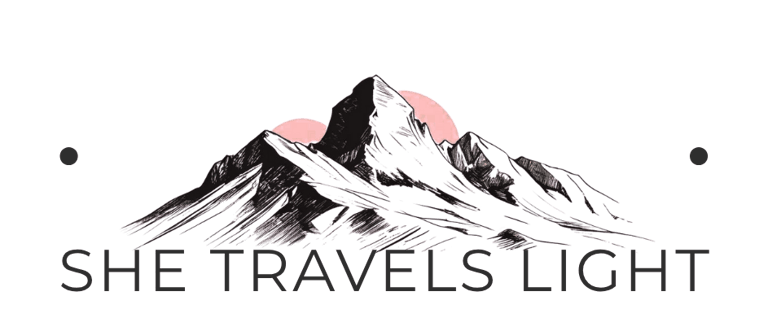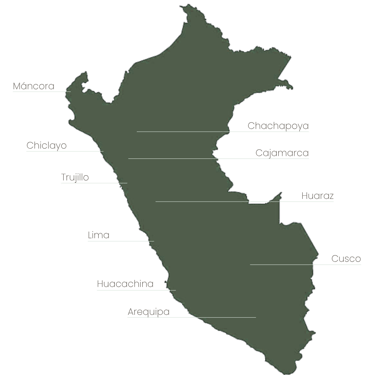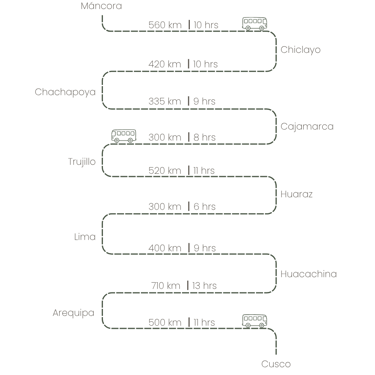Backpacking Peru: The Ultimate North to South Itinerary (6 weeks)
Discover the ultimate North to South Peru itinerary, six weeks of beaches, mountains, deserts, and high-altitude hikes. From Mancora to Huaraz and the Salkantay Trek, here’s how to backpack Peru by bus and make the most of every stop. Part of the Peru Itinerary Series for Adventurous Female Backpackers.
Backpacking Peru: The Ultimate North to South Route (6 weeks)
Discover the ultimate North to South Peru itinerary, six weeks of beaches, mountains, deserts, and high-altitude hikes. From Mancora to Huaraz and the Salkantay Trek, here’s how to backpack Peru by bus and make the most of every stop. Part of the Peru Itinerary Series for Adventurous Female Backpackers.
13/10/2025 • 15 min read
This is the route for travelers who want to see everything Peru has to offer, from surf beaches and pre-Incan ruins in the north to the desert, canyons, and high Andes in the south.
It follows roughly the same path I did over 52 days but trimmed down to a realistic 40–45 days, so you can skip what needs to be skipped, and spend more days where it matters, without feeling rushed.
The following itinerary takes you from the border of Ecuador and all the way down to the border of Bolivia. No flights, only overland travel.
Stop 1: Máncora
Days: 3
Máncora, on Peru’s northern coast, is a perfect place to start your journey if you’re entering from Ecuador. The small surf town has a warm, beachy energy — relaxed and social. It’s where I recovered from border crossings and adjusted to the rhythm of Peru. It’s okay for a rest stop if you’re coming from Ecuador, but not a must-see in my opinion.
What to do
Watch the sunset from the beach — that’s when Máncora feels most alive.
If you surf, you might enjoy the waves. If not, this might just be a recovery stop before moving inland.
Join a party at Selina or The Point.
Where to eat and drink
Tallan Restobar: Get your first Peruvian Ceviche with direct view to the sea.
Saxsay Fusion: Also delicious ceviche, just cheaper and located on the mainstreet.
Mancora is a party town. Go to the mainstreet and pick any bar for a drink or two.
Where to stay
Casa Mancora Guesthouse (15 USD/N): It's giving surf vibes and very friendly host. 9,2 out of 10 on booking.com - not sponsored (October 2025).
How to get to the next stop: Chiclayo
From Máncora, take a bus to Chiclayo (8 hours). The route is well-serviced by companies like Cruz del Sur or Civa. Book online via redBus Peru (not sponsored, but I used this a lot) or buy the ticket at the bus station: Ctra. Panamericana N (between Parrillerop D Barrio and Restaurant EL ARRECIFE).
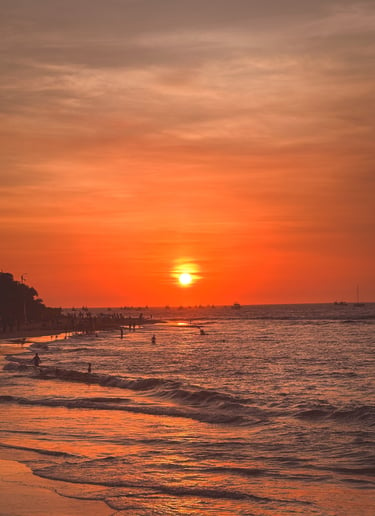

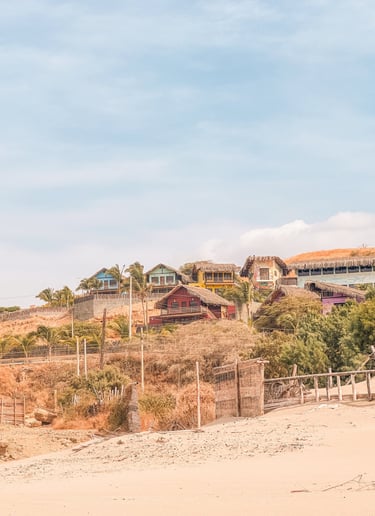


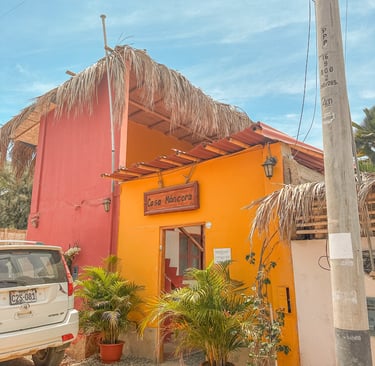
Stop 2: Chiclayo
Days: 2
Chiclayo didn’t make much of an impression on me. It felt more like a transit city than a destination in itself — useful for breaking up a long journey (why I have added it to the itinerary) but not a place I’d linger. If you arrive in the evening as I did and have a night bus the following day, you'll have a whole day in the city.
What to do
Visit the Museo Tumbas Reales de Sipán in Lambayeque — one of the best museums in the country.
Explore Huaca Rajada, where the Lord of Sipán tomb was discovered.
Walk through the Mercado Modelo, a chaotic local market famous for its witchcraft section (mercado de brujos).
Where to eat and drink
I don't know the name of the place, but I can tell from pictures, that we had chifa, which is a popular Peruvian-Chinese fusion cuisine. It blends traditional Chinese cooking techniques and ingredients with Peruvian flavors and ingredients. There is not the place in Peru where you can't find chifa. It's a tasty fusion that comes at a good price and with a big menu card.
How to get to the next stop: Chachapoyas
From Chiclayo, take an overnight bus to Chachapoyas (10–12 hours). Movil Tours offers comfortable options. Book online via redBus Peru or buy the ticket at the bus station: at the corner of Av. Luis Gonzales and Av. Fransisco Bolognesi (if Movil Tours).
Stop 3: Chachapoyas
Days: 4
Chachapoyas was amazing — one of my favorite stops in the north. I would have loved one extra day to take it slower. We did a day tour to the tall Gocta Waterfall, but just before reaching it, the sky opened up and it became too dangerous to continue. Even without seeing the waterfall itself, the landscape and the atmosphere around Chachapoyas were unforgettable.
What to do
Visit Kuelap Fortress — it’s what many call the “Machu Picchu of the north.”
Do a day trip or hike to Gocta Waterfall (if weather allows).
Visit Mirador del Cañon de Huancas Sonche for an incredible view of the Sonche cliff.
Wander around town and enjoy how local and peaceful it feels.
Where to stay
Hostal Norte Backpackers (14 USD/N): Central location, chill vibes, and the most cosy common area. 8 out of 10 stars on hostelworld.com (October 2025).
How to get to the next stop: Cajamarca
Book online via redBus Peru or buy the ticket at the bus station. Turismo Virgen del Carmen is a company that offer this travel - ask the staff of your accommodations where to find the office.
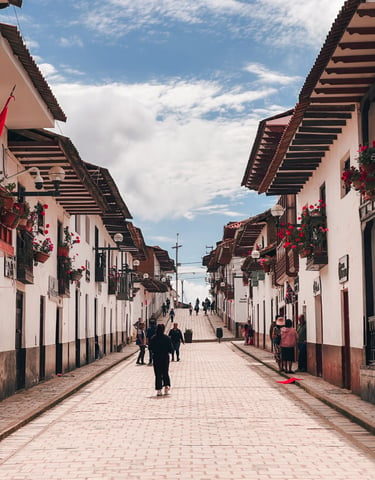

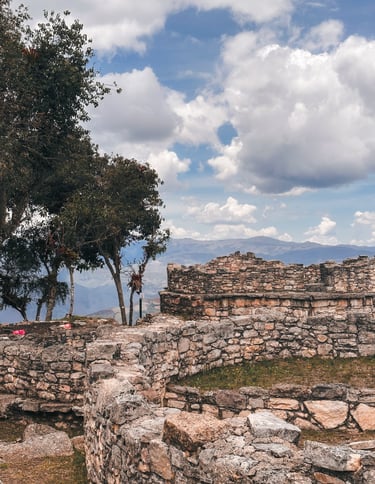

Stop 4: Cajamarca
Days: 3
Cajamarca reminded me a lot of Chachapoyas — equally charming and surrounded by green hills — but Chachapoyas made a bigger impression and was less crowded. The distance is long, and I would therefore recommend at least three days, to recover from the travel. However, if you don't mind, limit the time here.
What to do
Visit Baños del Inca, known for its hot springs.
Stroll around the Plaza de Armas and climb up Cerro Santa Apolonia for views.
Visit the Ventanillas de Otuzco, which is the necropolis of a pre-Inca population. Hundreds of impressive niches located side by side in the huge rock of a ravine.
Where to eat and drink
Kaphiy Perú: For a very good cup of coffee, this is the place.
Leche de Tigre in the corner of Plazuela Belén. It's like ceviche in a cup. It looks questionable, but when you see the line in front - a good mix of locals and tourist - you know what's up. It was so tasteful.
Where to stay
Casa El Capulí Hospedaje (15 USD/N): Had a nice yard, shared bathroom, and a friendly host. 9,3 out of 10 on booking.com (October 2025).
How to get to the next stop: Trujillo
Take a daytime bus from Cajamarca to Trujillo (around 7 hours). It’s a scenic but winding drive, so plan for motion sickness if that affects you. Or take a night bus, but make sure that you can do early check-in at the accommodations.
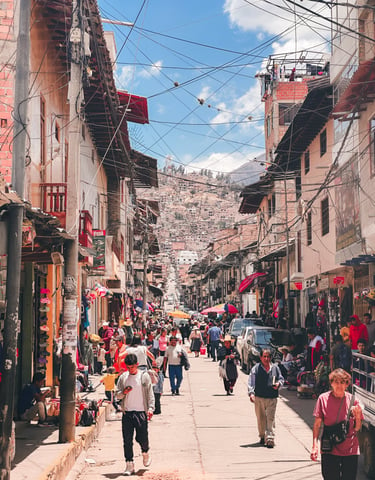

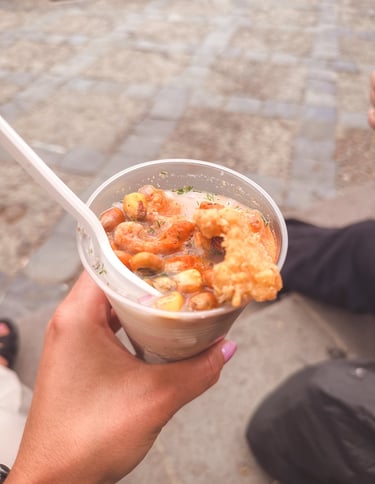

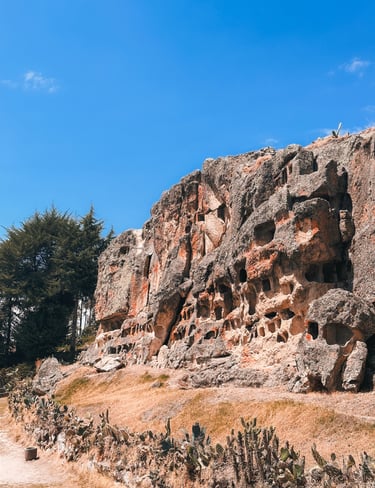

Stop 5: Trujillo
Days: 2
If possible, I’d skip Trujillo. It didn’t really stand out to me, but the reason I stopped was to avoid an extremely long direct journey to Huaraz. The city itself didn’t add much to the experience, though the surrounding archaeological sites are interesting if you have an extra day.
What to do
Visit Chan Chan, the adobe city of the Chimú civilization.
Check out Huacas del Sol y de la Luna, if you enjoy ancient history.
Walk around in the city and stretch your legs before the next long-distance bus.
Where to eat and drink
Restaurant - Sabor Peruano: Starters, main, and fresh juice for about 5 USD. What's not to like. However, this place is a little far out, but we did go for along walk that day to see as much as possible before the night bus. Here, I tasted Papa a la Huancaina, which features tender boiled potatoes topped with a creamy, zesty sauce known as huancaína (from the area of Huancayo, in the central highlands of Peru). Simply but tasty! I am sure you can find it somewhere else, just look for the name on 'Menu del Dia'.
Where to stay
Yaqta Hostel (20USD/N): Good location, sociable and with a cool common area and true hostel vibes. 9,2 stars out of 10 at hostelworld.com (October 2025).
How to get to the next stop: Huaraz
Take an overnight bus to Huaraz (8-10 hours). Book online via redBus Peru or buy the ticket at the bus station.
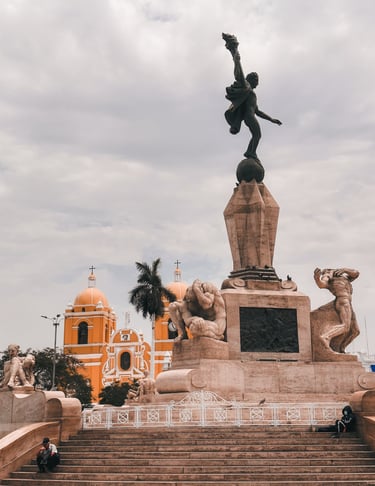

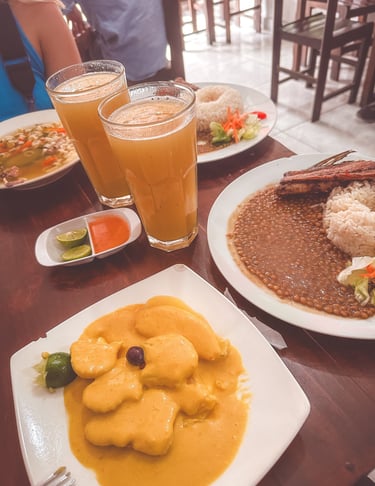

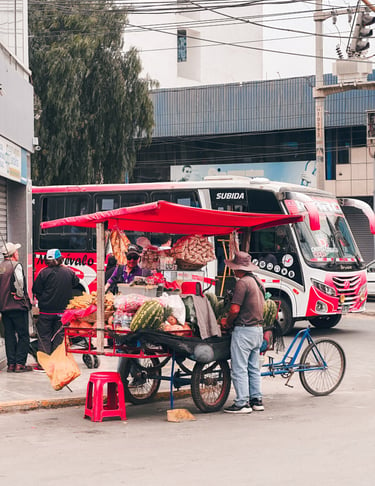

Stop 6: Huaraz
Days: 7-10
If you haven’t acclimatized yet, take it slow — the altitude here (3,000m) is no joke and why I have put in some extra days. Huaraz became one of the highlights of my trip, and we actually came back for more later on the same South American trip, spending almost three weeks in total (including volunteering).
It’s a great place to pause, breathe, and explore nature at your own rhythm. For hikers, this is paradise. But this is also the stop where you can trim down the days a bit if one or two hikes are more than enough to satisfy you - because this is the capital of hiking.
What to do
Day hikes to Laguna 69, Laguna Parón, Laguna 513, Laguna Tullpaccocha, Laguna Churup, Laguna Llaca, and Wilcacocha (you can read the ranking of all the hikes I did in South America, including the ones mentioned above, here).
If you’re up for it, try a multi-day trek like Santa Cruz or Huayhuash. I didn't do it due to prioritisation but want to go back for this!
Relax in thermals baths in either in Chancos Thermal Baths or Monterrey Baths.
Where to eat and drink
Hierba Buena is the place you go for good, traditional Peruvian food. It's a bit more expensive than what I would usually go for when travelling on a budget, but if you should have a cheat day, let it be there.
Where to stay
Montañero Hostel (9 USD/N incl. breakfast): Actually, I only recommend this place because the staff is super nice and flexible. The location is not great and the common area could use a caring hand. Nonetheless, we went back both times for a reason. I could imagine that it's pretty social during high-season. 8,1 out of 10 on booking.com (October 2025).
How to get to the next stop: Lima
Take a night bus from Huaraz to Lima (8–9 hours) to save money on accommodations or do it during the day as it's a very scenic view. Book online via redBus Peru or buy the ticket at the bus station.
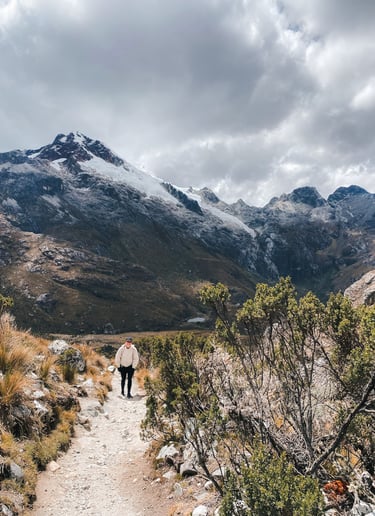

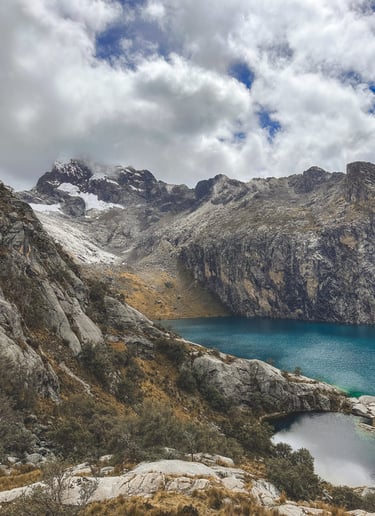

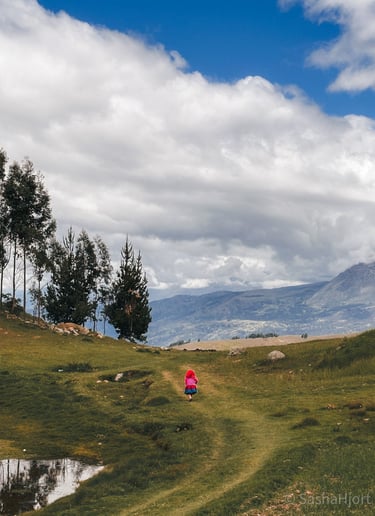

Stop 7 – Lima
Days: 3
I’ll be honest — I wasn’t a big fan of Lima. Traveling as two women, it didn’t feel like a city I wanted to explore too deeply. There are nice areas and good food, but if you’re looking for that capital-city buzz, I’d say look elsewhere. Peru is about its landscapes, not its capital.
That said, it’s still worth a couple of days — mostly to regroup, enjoy a few comforts, and prepare for the long southern stretch. If you arrive after a night on the road and leave in a night bus on the third day, you'll have almost three full days.
What to do
Visit Barranco, the artistic neighborhood, for cafés and murals.
Try some good food — Lima is known for it, even if the city itself didn’t win me over. We did a DIY food tour, following Netflix show "Watch Street Food: Latin America".
Do a ceviche and Pisco Sour cooking class with Llaqta Wasi.
DIY walking tour through the Historic Center and/or Miraflores, or do a Free walking Tour (10 USD) with for example Guru Walk - I really enjoyed these tours.
Where to eat and drink
Milenaria Cafe: Enjoy a coffee and a sweet treat in this cosy establishment in a nice areas of the city.
Al Toke Pez: A busy place, so expect a line. They serve the best ceviche, rice with seafood, and deep-fried giant squid. If you haven't seen it already, this place is also featured in Netflix series: Street Food: Latin America.
Restaurante Huerta - Chinen: Another busy place for lunch. They serve traditional Peruvian cuisine. Just order what ever the locals are eating!
Where to stay
The Secret Garden Hostel (10 USD/N): Unlike the other recommendations, this price is for a dorm. I think it's worth it as it's located in the charming neighbourhood, Miraflores. The place has true hostel vibes. 7,7 out of 10 on hostelworld.com (October 2025).
How to get to the next stop: Huacachina
There are several daily buses from Lima to Ica (around 4–5 hours). You can also stop in Pisco if you plan to visit the Paracas National Reserve. However, what we did was to book a guided tour, which took us to Las Ballestas (to see sealions), then to Pisco where we tried different kinds of Pisco, and then in the end, to the desert oasis Huacachina. The original itinerary was going from the desert to the small town close by, Ica, to take a night bus to the next stop.
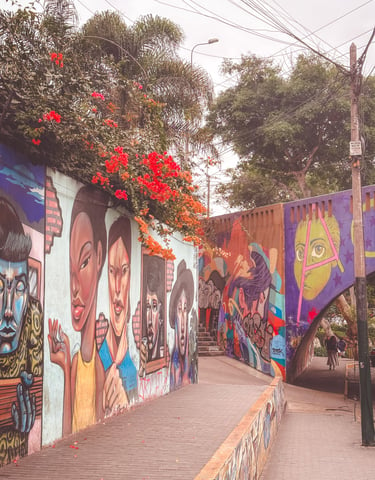

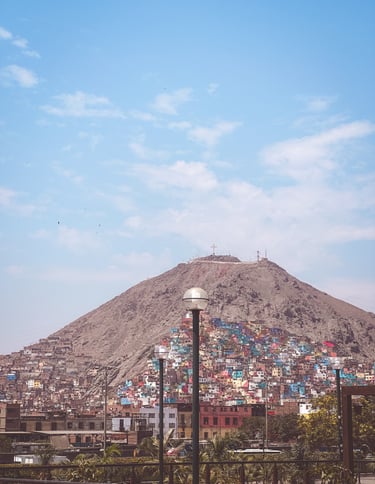

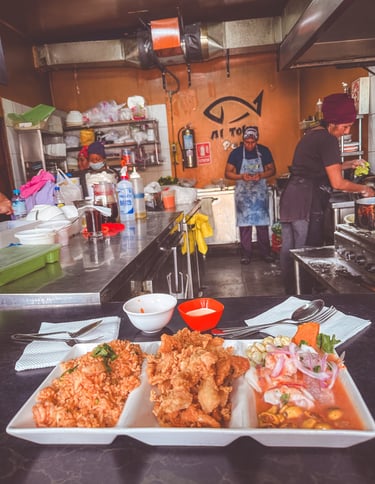

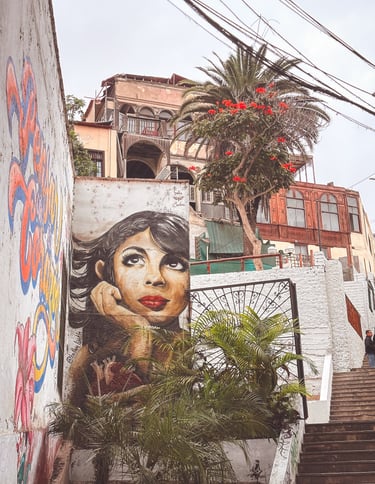

Stop 8: Huacachina
Days: 2 (optional)
I have mixed feelings about this stop. If you’ve read my post about the Uyuni Salt Flats tour, you might already guess why. I’m happy I went — because it connected us naturally toward Arequipa — but it was also one of the most touristy parts of Peru for me. We went with a group tour from Lima to here, so we could see Las Balletas and Pisco on the way.
We did the usual: the desert dunes, the oasis, the group tours. But honestly? Taking group pictures with strangers, following a guide’s schedule, eating at tourist stops — it’s just not for me. I missed the freedom of traveling independently.
Still, as with Uyuni, I’m glad I experienced it once. Seeing the endless desert is impressive, and if you’ve never been in dunes that size, it’s worth it for that reason alone. From research I know that there should be some pretty fun oasis hostels. A bit pricy, but should be a nice experience - and this itinerary is more about experiencing all without being too stressfull.
What to do
Visit Huacachina Oasis, try sandboarding and dune buggy.
If you’re into wildlife, go on a boat tour to the Ballestas Islands near Paracas (would be on the way to the desert).
Visit Pisco for some Pisco tastings on the way to the desert.
Or, simply use this as a transit stop toward Arequipa.
How to get to the next stop: Cusco
To get from Huacachina to Ica, you can go with a little tuc-tuc kind of looking scooter. It's a very short ride. From Ica, take a night bus to Arequipa (around 12 hours). Buses are comfortable, and it saves you a night of accommodation. For this trip I would just buy the tickets online on RedBus so you don't have to spend too much time in Ica, trying to find the bus station to buy them there.
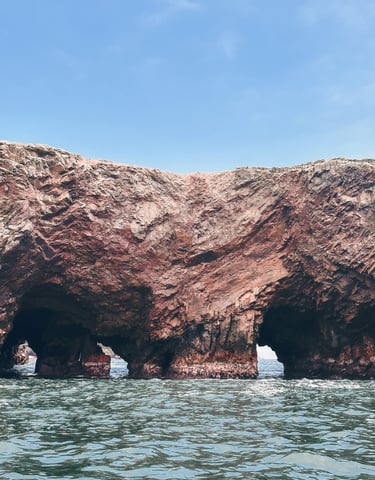

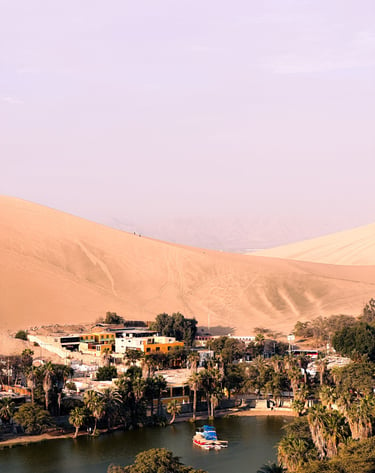

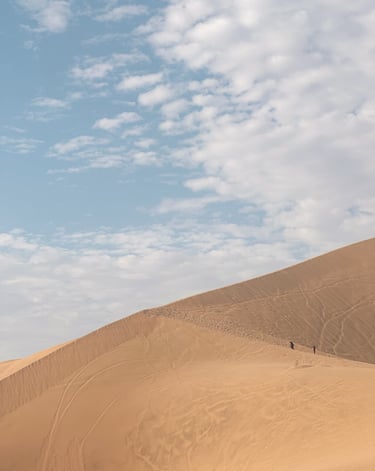

Stop 9: Arequipa
Days: 4
We had too few days here, and I regret that. Arequipa instantly became one of my favorite cities in Peru — beautiful architecture, a calm vibe, and surrounded by volcanoes. It feels more like a charming town than a big city, and the food in the south? Just wow.
If I could redo this trip, I’d stay longer and do the Colca Canyon trek, which we didn’t have time for.
What to do
Explore the Santa Catalina Monastery — it’s like a city within a city.
Visit Mirador de Yanahuara for views of El Misti volcano.
Go for a walk in Calle Mercaderes for its shops and cafes and the historic San Lázaro neighborhood for its charming, old-world atmosphere.
Take a multi-day trek to Colca Canyon. Most hostels have tours you can join.
Go climbing with an instructor. It was the first time I ever tried and it was terrifying and amazing at the same time. We booked through our hostel.
Where to eat and drink
La Nueva Palomino Picantería: Want to try tradicional Arequipeña food? Then this is the place! The location is in a nice neighbourhood with small streets and white houses, the food is amazing, and there has been thinking about every little details in the restaurant's interior design.
My favourite 'Menu del Día' was in Arequipa. The food in this area is so flavourful and variated, which is also reflected in the lunch offers.
Where to stay
Econunay Hostels (24USD/N incl. breakfast): Good private room, cosy common areas, functional kitchen, kind and social staff, and all in all a great atmosphere. 9,3 out of 10 stars on hostelworld.com (October 2025).
How to get to the next stop: Cusco
There are long-distance buses from Arequipa to Cusco (10–11 hours). Book online via redBus Peru or buy the ticket at the bus station.

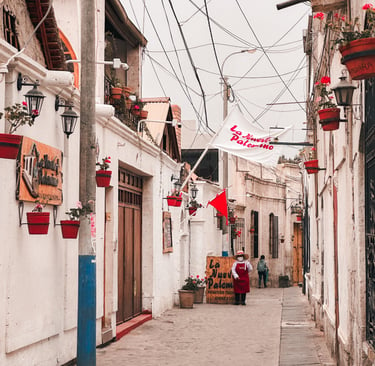
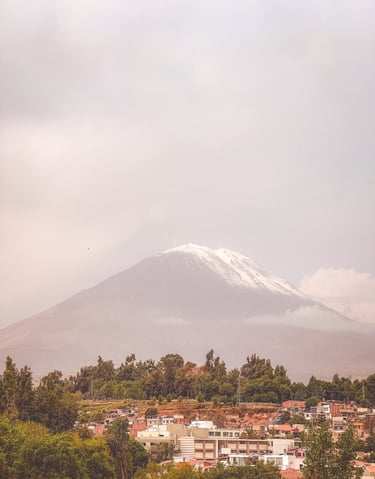

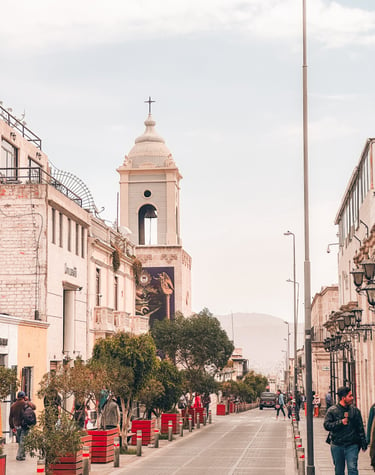

Stop 10: Cusco
Days: 10-12
Cusco is where many travelers either start or end their big trek — and for good reason. The city itself is lovely, though definitely tourist-heavy, with plenty of cozy cafés and a mix of local and traveler energy.
This stop includes 4 or 5 day Salkantay Trek or Inca Trail in the middle. So three days before and two or three days after the multi-day hike.
What to do
Visit the San Blas neighborhood for cafés and artisan shops.
Explore Sacsayhuamán ruins just above the city.
Enjoy the view of Cusco from Mirador de San Cristobal - and feel the altitude.
Take a day-trip to Pica.
Use the time to prepare for your trek — Salkantay or Inca Trail (I did the Salkantay Trek and will cover that in another post)
When you come back from the multi-day trek, get a massage.
Where to stay
El Sleepy Mouse (16USD/N): Nice, quiet hostel about 10 mins walk from Plaza de Armas and with a fully equipped kitchen. Also one of the more affordable hostels with private rooms. 9 out of 10 stars on Hostelworld.com (October 2025).
How to get to the next stop: La Paz (Bolivia)
Buses go directly from Cusco's main bus terminal to Bolivia's Capital, Las Paz. It's a long journey of 14-16 hours.
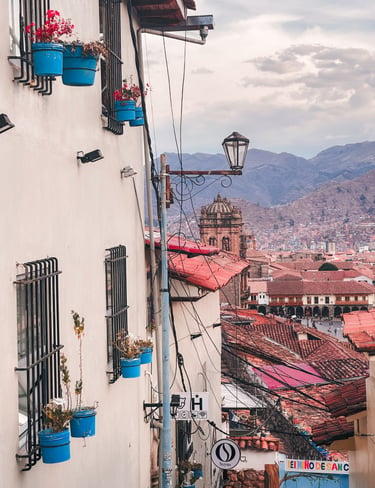

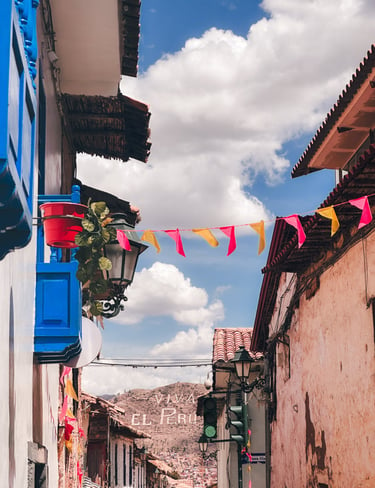

Final notes
The itinerary I propose would work out for me as it is, but it’s important that you plan it in a way that suits your interests and curiosity. I’m a nature lover and have given extra time to the places where you can experience incredible landscapes and challenge yourself outdoors. That might not be for everyone — and that’s perfectly okay.
The most important thing to know is that it’s entirely possible to travel by bus through all of Peru, and I find that amazing. It’s cheap, mostly comfortable, and offers beautiful scenery along the way — unless, of course, you’re on a night bus (which is still a great way to save money on accommodation).
Adjustments to the itinerary
From Cusco to La Paz:
As you’ll pass through Puno and Lake Titicaca on the way to La Paz, you might want to add this as a stop on your itinerary and break up the long bus journey. We didn’t do it because we already had our Uyuni Salt Flat Tour planned — you can read more about that experience here and why I had mixed feelings about it.
What to pack
With this itinerary, you’ll need to pack everything from a bathing suit to a winter jacket and rain pants. It’s absolutely possible if you pack smart — I’ve done it myself while traveling for six months across South America. You can read all about my packing list here.
And one more thing: you’ll spend a lot of hours on buses. Make it as comfortable as you can and only bring what’s necessary. I’ve also made a separate list with all my bus travel essentials, which you can read here.
